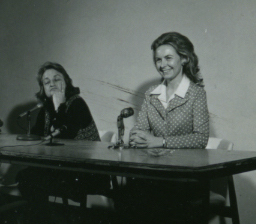Mrs America’s Episode Four portrays Phyllis Schlafly’s debate with Betty Friedan infamously and incorrectly. The opening scene depicts Phyllis receiving debate coaching from her husband Fred Schlafly. He emphasizes using emotional repertoire to unhinge one’s opponent.
In the episode, Phyllis wryly jeers, “The ERA will not solve your personal problems…. It most certainly will not keep your husband from being jealous, or petty, or dumping you in your middle age for a new younger model after you have devoted yourself to keeping his home for twenty or thirty years because you simply cannot legislate universal sympathy for the middle-aged woman.”
This entirely invented dialogue is written to invoke sympathy for the feminist icon. When the fake Phyllis finishes her fake diatribe, the fake Friedan says the only real line in the entire exchange: “I’d like to burn you at the stake!”
Hollywood intentionally falsifies Phyllis and Betty’s debate to christen Phyllis as a new debater who is unsympathetic and shallow. This was not Phyllis’s first debate nor was it Betty’s. As author of a New York Times best-selling book and a prominent feminist figure, Betty was as Ed Martin says, “calculating and shrewd.”
In the real 1973 debate, Phyllis’s quote is nothing like the one in Hulu’s miniseries. Ed Martin cites the true quote from Phyllis that evoked Friedan’s violent line, “Wife and mother can be a woman’s number-one fulfilling career, and she can enter the workforce if she chooses to.”
This quote does not justify a violent threat from Friedan. As for Phyllis delivering personal blows, she did not believe in personally attacking people. Hollywood flips this entire situation to portray Phyllis as one to personally attack her opponents, but in the real debate, it was Betty who did exactly this.
Hollywood continually uses Phyllis’s life to rewrite history. Phyllis’s personal records of her own life and other sources prove Hollywood wrong each time. Mrs. Schlafly was not an individual who lowered herself to the standards of her opponents. She maintained her standards, challenging her opponents to rise to her level. Phyllis was a leader promoting human dignity, especially when debating. Each one of us has much to learn from her confidence, compassion, and conviction in the face of great opposition.

